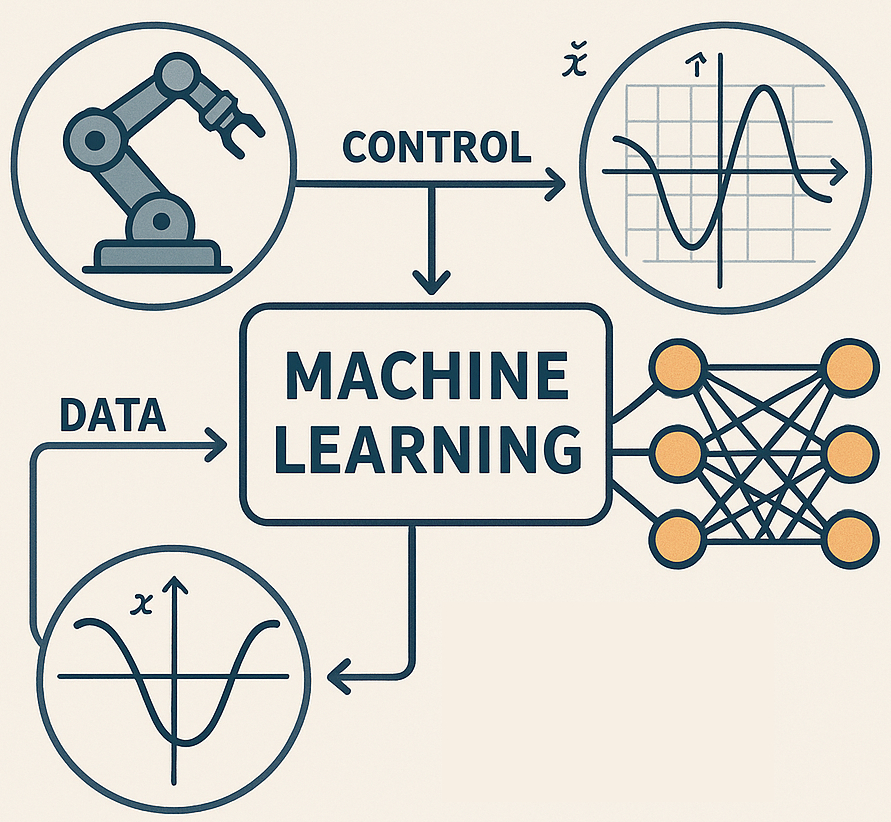Machine Learning Control Project
The Machine Learning Control Project explores how modern data-driven techniques can augment or replace traditional control design methodologies. While classical control theory depends heavily on first-principles modeling, many real-world systems are too complex, nonlinear, or uncertain for purely analytic models to capture effectively. This project investigates approaches in which machine learning—ranging from sparse regression to deep neural networks—plays an active role in modeling, identification, and controller synthesis.
Research topics include dynamic mode decomposition (DMD) for reduced-order modeling, sparse identification of nonlinear dynamics (SINDy) for interpretable model discovery, nonlinear system identification for control-oriented modeling, and model predictive control (MPC) informed by learned dynamics. The project also studies nonlinear optimal control, deep reinforcement learning for policy learning, and hybrid schemes that integrate learning-based models with robust or adaptive control architectures.
Applications span robotics, autonomous navigation, and other cyber-physical systems, with an emphasis on real-time feasibility and safety-critical operation. A recent example is the Master's thesis work by Ariful Islam (2024), which developed a semantic command–based obstacle avoidance controller for a mobile robot using deep learning to predict safe navigation trajectories. This study demonstrated how learned models can replace or complement conventional control pipelines while retaining interpretable structure for system verification.
The broader goal is to develop a principled framework for machine learning–enhanced control systems—one that bridges rigorous control theory with flexible, adaptive learning methods to enable robust, high-performance control in challenging environments.

Publications
- Islam, Ariful. "Robot Obstacle Avoidance: A Deep Neural Network Approach".
Grants
-
Data-Driven Control and Reinforcement Learning for Autonomous Embodied Systems in Defense Applications
This proposal seeks funding to establish the AI & Robotics Engineering Lab (AIRE Lab)—a research and teaching facility equipped with advanced mobile robots, manipulators, drones, and prosthetic systems. The lab will support interdisciplinary research in reinforcement learning, interpretable dynamics modeling, and autonomous systems with a focus on real-world defense applications such as mobile manipulation, drone autonomy, and prosthetic control. The AIRE Lab will also serve as the core instructional platform for the proposed B.S. in Artificial Intelligence and Robotics Engineering (AIR) degree. It will expand project-based learning across engineering and computer science programs, enhance undergraduate research, and support regional STEM outreach—especially for military-connected students. This initiative will build Saint Martin’s capacity for externally funded defense research and help shape the next generation of roboticists and AI engineers.
Dr. Picone's Role: Principal Investigator
Amount Requested: $688,918.15
Funding Agency: Department of Defense
Submission Date: April 2025
Research Themes
Artificial Intelligence
Exploring the architectures and symbolic frameworks that underlie intelligent behavior in machines. This theme bridges classical and contemporary AI approaches—including logic, language models, and neural architectures—with a special focus on how AI systems represent knowledge, make decisions, and relate to human users. Psychoanalytic theory is used to interrogate assumptions about mind, subjectivity, and trust.
Feedback Control Systems
Designing systems that regulate themselves in the presence of uncertainty, noise, and delay. This theme focuses on classical and modern control theory, with applications in mechatronics, instrumentation, and robotics. Work includes system identification, nonlinear control, and real-time computing, often extending into philosophical questions about autonomy and agency.
Human-Computer and Human-Robot Interaction
Exploring the symbolic, embodied, and ethical dimensions of interaction between humans and intelligent systems. This theme examines the mutual shaping of humans and machines—how robotic and AI systems are interpreted, trusted, and engaged with by humans, and how those systems can be designed to accommodate subjectivity, ambiguity, and ethical asymmetry.
Machine Learning
Developing learning algorithms for adaptive, nonlinear systems in uncertain and dynamic environments. This theme includes supervised, unsupervised, and reinforcement learning approaches applied to real-world systems. Particular emphasis is placed on interpretability, embodiment, and the use of machine learning to model or simulate symbolic structures, including those derived from psychoanalytic theory.
Robotics
Designing, modeling, and analyzing robotic systems that interact with and adapt to the physical world. This theme encompasses autonomous mobile robots, manipulation, and human-robot collaboration. Emphasis is placed on real-time operation, sensorimotor integration, and the philosophical implications of embodied agency.

